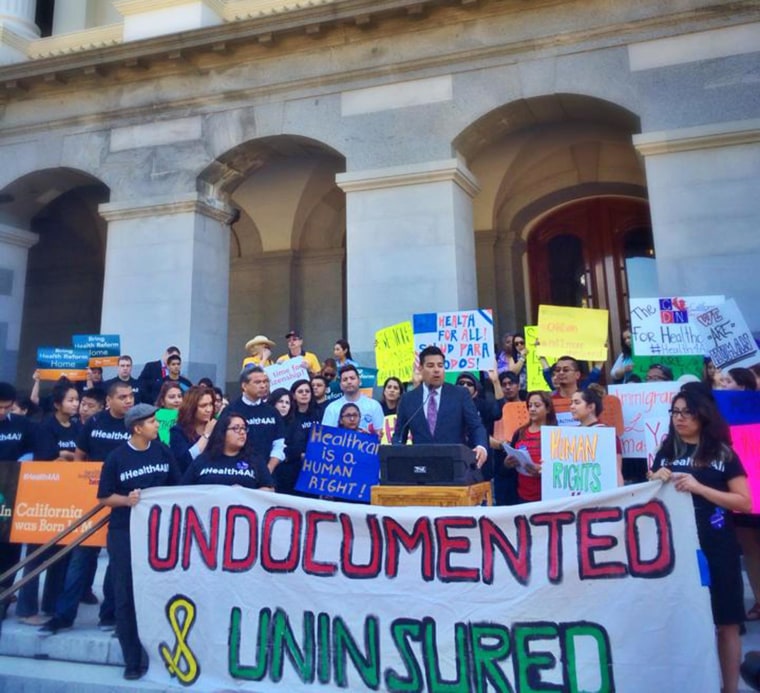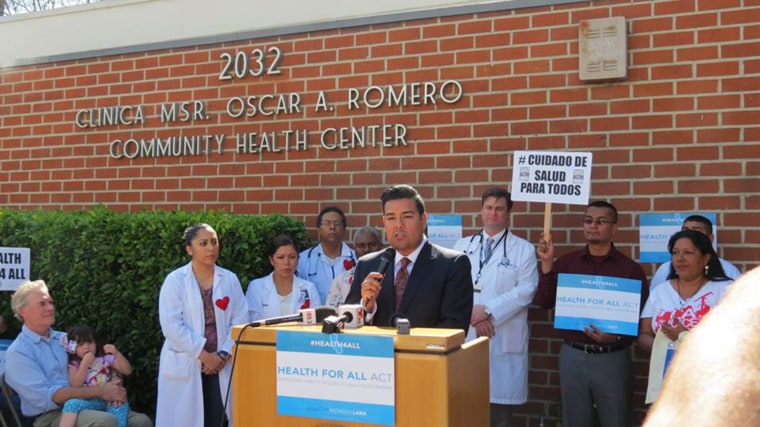If you grow up in a two bedroom house in a Latino barrio with four siblings sharing a king sized bed and your parents came from Mexico as undocumented immigrants, odds are you won’t become a California legislator. Yet that describes the unlikely trajectory of California State Senator Ricardo Lara.
“I grew up translating for my parents and going to parent teacher conferences. I thought everyone grew up that way,” said the Commerce, California native. Lara’s parents, a seamstress and a factory worker, made minimum wage. Both gained legal residency during the amnesty program of 1986.
Lara, who is 39, grew up in the heavily Latino neighborhood known as East. L.A., and had little experience outside his cultural bubble.
“The first time I ever got to order a pizza I was 18,” he recalled.
The California state legislator talked of what it was like to grow up in East L.A., a neighborhood known as the birthplace of the Mexican American Civil Rights movement.
"The high school walkouts, the murder of Ruben Salazar, the Chicano moratorium, all the demonstrations against the Vietnam war happened in East LA - all those events laid the foundation for me to be who I am today," he recalled.

In 1994, Californians voted in favor of Proposition 187, aimed directly at prohibiting state services such as education and healthcare for immigrants who were not in the country legally. Although the California Supreme court found the legislation unconstitutional and the law was never implemented, it ignited a fury of protests, especially among young Latinos like Lara.
"I became politically conscious," he said. "That bill was a direct attack at my folks and it was blatant and it was in your face and so something in me woke up.”
For Lara, the events became a wake-up call on the need to get a proper education. “I remember my mom very vividly saying, let them attack us, but with a college degree, they’ll never be able to take that away from you." He took his mother's remarks to heart, he said.
Prop 187, as it was called, also helped ignite a spike in political participation by Latinos in the state legislature. The Latino caucus has doubled its numbers since that time.
Lara’s upbringing and surroundings helped shape his passion for politics, and his political career took off around the State Assembly. He started as a staffer and eventually was Chief of Staff to the Majority Leader and district director to the Speaker, among other positions. After years working for powerful politicians, Lara was encouraged to run for office himself.
But there was another issue that needed to be addressed. He was comfortable with his sexual orientation - he is gay - but it was another thing to be public about it.
“When I was first approached to run for office, I was very skeptical because it took me forever to love myself enough to be able to express who I really am," Lara explained. "So if I was going to run, I was not going to go back into the closet,” he said.
As an openly gay candidate, Lara was advised to run in a wealthier, more liberal district. Lara refused. He wanted to run in a district that reflected his upbringing and immigrant roots.
As an openly gay candidate, Senator Lara’s friends and advisors thought it would be best for him to run as a candidate from the west side of Los Angeles. Cities like West Hollywood or Santa Monica are known for being accepting of gay candidates. Lara refused. He wanted to run in a district that reflected his upbringing and immigrant roots. He wanted to represent the people he grew up with and help those that had influenced his politics. He knew running as an openly gay candidate in a heavily Latino community might be a risk, but he understood the issues that affected his constituents and was confident in his abilities to serve.
After twelve years as a political staffer and two years as a state Assemblyman, Lara ran for a California State Senate in 2012 and won. He became the first openly gay senator to represent his district and one among eight members of the LGBT Caucus in the state capital.
During his short tenure as a state senator, Lara has sponsored legislation to help integrate the state's immigrants. Legislation he has sponsored include a bill allowing undocumented immigrants the opportunity to pay affordable health insurance as well as a bill to assist undocumented students with obtaining college loans. He has also sponsored anti-bullying legislation for the state's public schools.
Lara is heartened by the support he has received from young Latinos.
“Now when I meet Latino gay kids, they say 'you inspired me to be who I am and I am going to come out to my parents; I want a career in public service but I didn’t think I could do this.' This is why I do the job," said Lara, "to be able to inspire LGBT Latinos and Latinas to pursue their dreams. My sexuality has not been a deterrent.”
Young gay Latinos have told Lara, 'I want a career in public service but I didn't think I could do this.'
Lara is equally proud to be a Latino Senator representing Latino constituents. “I’m in my neighborhood and love serving my neighborhood.” Latino representation in the state legislature is approaching 25 percent while the state's Latino population is near 40 percent. In fact, the state reached a demographic milestone recently as the number of Latinos slightly exceeded the number of non-Latino whites.
Senator Lara is not satisfied with the current representation of Latinos and Latinas in the legislature. He said it was time to be more aggressive and step up outreach efforts so the the government can truly represent California’s electorate. “The future of Latinos and Latinas is the future of California,” Lara said.
